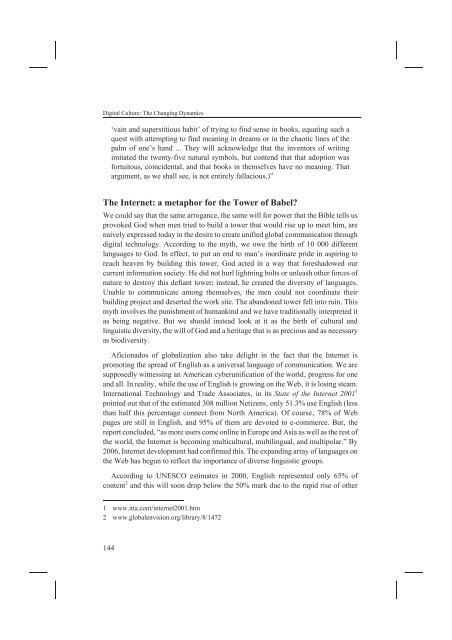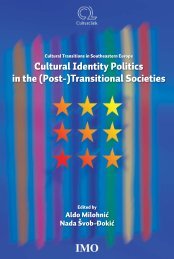D:\Documents and Settings\Ana\My Documents\Biserka-knjiga ...
D:\Documents and Settings\Ana\My Documents\Biserka-knjiga ...
D:\Documents and Settings\Ana\My Documents\Biserka-knjiga ...
You also want an ePaper? Increase the reach of your titles
YUMPU automatically turns print PDFs into web optimized ePapers that Google loves.
Digital Culture: The Changing Dynamics<br />
‘vain <strong>and</strong> superstitious habit’ of trying to find sense in books, equating such a<br />
quest with attempting to find meaning in dreams or in the chaotic lines of the<br />
palm of one’s h<strong>and</strong> ... They will acknowledge that the inventors of writing<br />
imitated the twenty-five natural symbols, but contend that that adoption was<br />
fortuitous, coincidental, <strong>and</strong> that books in themselves have no meaning. That<br />
argument, as we shall see, is not entirely fallacious.)”<br />
The Internet: a metaphor for the Tower of Babel?<br />
We could say that the same arrogance, the same will for power that the Bible tells us<br />
provoked God when men tried to build a tower that would rise up to meet him, are<br />
naively expressed today in the desire to create unified global communication through<br />
digital technology. According to the myth‚ we owe the birth of 10 000 different<br />
languages to God. In effect‚ to put an end to man’s inordinate pride in aspiring to<br />
reach heaven by building this tower‚ God acted in a way that foreshadowed our<br />
current information society. He did not hurl lightning bolts or unleash other forces of<br />
nature to destroy this defiant tower; instead, he created the diversity of languages.<br />
Unable to communicate among themselves, the men could not coordinate their<br />
building project <strong>and</strong> deserted the work site. The ab<strong>and</strong>oned tower fell into ruin. This<br />
myth involves the punishment of humankind <strong>and</strong> we have traditionally interpreted it<br />
as being negative. But we should instead look at it as the birth of cultural <strong>and</strong><br />
linguistic diversity, the will of God <strong>and</strong> a heritage that is as precious <strong>and</strong> as necessary<br />
as biodiversity.<br />
Aficionados of globalization also take delight in the fact that the Internet is<br />
promoting the spread of English as a universal language of communication. We are<br />
supposedly witnessing an American cyberunification of the world‚ progress for one<br />
<strong>and</strong> all. In reality‚ while the use of English is growing on the Web‚ it is losing steam.<br />
International Technology <strong>and</strong> Trade Associates‚ in its State of the Internet 2001 1<br />
pointed out that of the estimated 308 million Netizens‚ only 51.3% use English (less<br />
than half this percentage connect from North America). Of course‚ 78% of Web<br />
pages are still in English, <strong>and</strong> 95% of them are devoted to e-commerce. But‚ the<br />
report concluded, “as more users come online in Europe <strong>and</strong> Asia as well as the rest of<br />
the world, the Internet is becoming multicultural, multilingual, <strong>and</strong> multipolar.” By<br />
2006, Internet development had confirmed this. The exp<strong>and</strong>ing array of languages on<br />
the Web has begun to reflect the importance of diverse linguistic groups.<br />
According to UNESCO estimates in 2000, English represented only 65% of<br />
content 2 <strong>and</strong> this will soon drop below the 50% mark due to the rapid rise of other<br />
1 www.itta.com/internet2001.htm<br />
2 www.globalenvision.org/library/8/1472<br />
144



